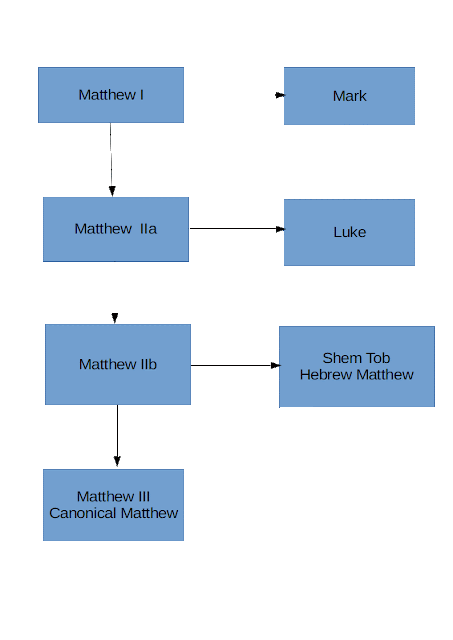All of "Luke's Great Omission" (corresponding to Mark 6:45-8:26) is essentially present in Hebrew Matthew (my Matthew IIb) Some of this material stretches credulity, but Luke included a lot of other stories that do the same. Some of it could be offensive to Gentiles, his main readership, but a slight rewording would have been sufficient. It really doesn't make sense that Luke would have omitted this material unless HE NEVER SAW IT. I believe that this material, called Luke's "Great Omission" by Markan Prioritists," is actually an early interpolation, but one later than the "Matthew IIa" that Luke made use of.
The Walking on Water incident is part of this early interpolation, and is included in Hebrew Matthew, and most of it is in Mark. But the part where Peter walks on water too (Mt.14:28-31) is not in Mark. Perhaps it is a later interpolation.
The words about the "leaven of the Pharisees and Sadducees" (canonical Mt. 16:6-8a) are missing in Hebrew Matthew (my Matthew IIb). Although these words have parallels in both Luke and Mark, this omission is a "Western" (early text) omission in the Greek tradition. It may, therefore, be a very late interpolation into the canonical Synoptic Gospels Its purpose is not obvious, but it may simply be anti-Semitic or anti-Judaistic. At any rate, it does sound like an interpolation, and is not at all necessary to the flow of the narrative.
The presence or absence of even a single word can be extremely interesting. For example, canonical Mt. 14:34 includes the place-name "Genessareth," which also appears in Mk. 6:53, but it is absent from the Hebrew Matthew of Shem-Tob, which I assign to the Matthew IIb layer of the Gospel of Mathew. At first I thought that this variant was insignificant, but it now seems to me to be very significant. It cannot have been left out of the Shem-Tob Matthew for any polemical reason, so I suspect that the inclusion of the place-name is a late interpolation, done to increase the air of credibility of the material. Apparently, all texts of the Greek tradition have it, although some give the name as "Genessar." More interesting, though, is that it appears in Mark 6:53. This could be due to a harmonistic insertion, or it could mean that Mark is the latest of the Synoptic Gospels. I'm inclined toward the latter explanation, but we shall have to look for corroborating evidence.
Text and image © 2019 by Donald C. Traxler.
Friday, July 5, 2019
Shabbat Shalom / שׁבּת שׁלוֹם
The word שׁלוֹם (shalom), which we translate as "peace," is related to a whole complex of words having to do with wholeness, completeness. This is because without peace to allow us to live, learn, grow, and thrive, our lives cannot be complete, cannot be whole.
War shatters lives and makes a mockery of the wholeness of life. It damages the planet and is an insult to humanity and to nature.
We must provide our children with a world in which they can thrive, a world characterized by peace. This cannot be achieved through war, but only through the pursuit of peace. We cannot wait for others to do it. It must start with us.
Shalom Salaam Pax Paix Paz Dohidv ꮩꭿꮫ
Text and image © 2019 by Donald C. Traxler.
War shatters lives and makes a mockery of the wholeness of life. It damages the planet and is an insult to humanity and to nature.
We must provide our children with a world in which they can thrive, a world characterized by peace. This cannot be achieved through war, but only through the pursuit of peace. We cannot wait for others to do it. It must start with us.
Shalom Salaam Pax Paix Paz Dohidv ꮩꭿꮫ
Text and image © 2019 by Donald C. Traxler.

